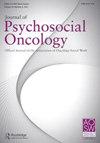我的孩子怎么样了——当父母患癌症时,父母对孩子的理解。
IF 1.5
4区 医学
Q4 PSYCHOLOGY, SOCIAL
引用次数: 1
摘要
探讨父母在理解孩子对父母癌症的反应和父母对孩子感知需求的反应时所面临的困难。对癌症患者及其伴侣进行定性访谈。11名患者和7名伴侣参与了研究。他们的孩子年龄在1-15岁之间。8名患者为母亲,平均28个月(7-104个月)前确诊为癌症。系统的文本浓缩归纳分析。父母在理解孩子的反应时是在黑暗中摸索。他们观察到孩子的痛苦迹象,但往往避免沟通情绪反应。我们认为父母难以控制自己和孩子的情绪是造成这种情况的重要原因。父母缺乏对家庭作为一个整体的相关支持。识别儿童的困难不能仅仅基于父母的评价。我们建议将家庭支持作为有未成年子女患者标准护理的一部分。本文章由计算机程序翻译,如有差异,请以英文原文为准。
How is my child doing - parental understanding of their children when a parent has cancer.
Abstract Objectives: To explore the difficulties parents face when understanding their children’s reactions to parental cancer and parents’ reactions to their children’s perceived needs. Research approach: Qualitative interviews with cancer patients and their partners. Participants: Eleven patients and seven partners took part. Their children were aged 1-15 years. Eight patients were mothers and cancer was diagnosed median 28 (7-104) months ago. Methodological approach: Inductive analysis with systematic text condensation. Conclusions: Parents were groping in the dark when understanding their children’s reactions. They observed signs of distress in their children, but often avoided communication about emotional reactions. We suggest parental difficulties in containing own and children’s emotions as an important cause for this situation. Implications: Parents lacked relevant support offers for the family as a unit. Identification of children’s difficulties cannot be based on parental evaluation alone. We suggest family support as part of standard care for patients with minor children.
求助全文
通过发布文献求助,成功后即可免费获取论文全文。
去求助
来源期刊

Journal of Psychosocial Oncology
PSYCHOLOGY, SOCIAL-
CiteScore
4.20
自引率
0.00%
发文量
36
期刊介绍:
Here is your single source of integrated information on providing the best psychosocial care possible from the knowledge available from many disciplines.The Journal of Psychosocial Oncology is an essential source for up-to-date clinical and research material geared toward health professionals who provide psychosocial services to cancer patients, their families, and their caregivers. The journal—the first interdisciplinary resource of its kind—is in its third decade of examining exploratory and hypothesis testing and presenting program evaluation research on critical areas, including: the stigma of cancer; employment and personal problems facing cancer patients; patient education.
 求助内容:
求助内容: 应助结果提醒方式:
应助结果提醒方式:


